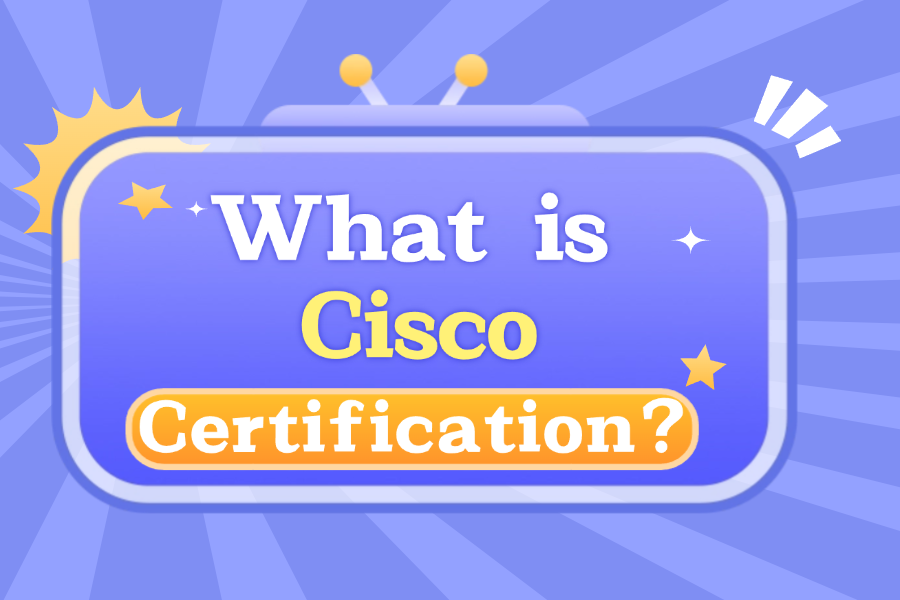How Does CCNP Advance Beyond CCNA in Terms of Direction and Certification Level?
Update time:2025-04-25
Cisco’s certification system is highly recognized in the networking industry. The CCNA (Cisco Certified Network Associate) serves as an entry-level certification and is often the first step for individuals entering the field of network technology. On the other hand, the CCNP (Cisco Certified Network Professional) builds upon that foundation and offers comprehensive advancements.

In terms of certification direction, CCNA, as a fundamental certification, covers relatively broad and basic topics. It mainly focuses on the essentials of networking—such as the TCP/IP protocol stack, basic routing and switching technologies, and some introductory concepts in network security. Its purpose is to build a foundational framework for beginners. For instance, in CCNA training, you’ll learn how to configure simple routers and switches to achieve basic network connectivity.
Contact me immediately to get the golden key helping you fast express your certificate.
WhatsApp:+63 975 072 4648
In contrast, the CCNP certification offers deeper and more specialized knowledge. It includes a variety of focus areas such as Routing & Switching, Design, Voice, Service Provider, Wireless, Security, and Service Provider Operations. Take the Routing & Switching track as an example: CCNP candidates are expected to understand and configure complex routing protocols like OSPF, EIGRP, and BGP with a high degree of proficiency. Not only must you master these protocols in isolated environments, but you also need to handle complex scenarios involving multi-area and multi-protocol network cooperation. On the switching side, CCNP goes beyond the basics by covering advanced topics such as Spanning Tree Protocol (STP) enhancements, EtherChannel technologies, and inter-VLAN routing—enabling professionals to design large-scale, highly reliable enterprise network infrastructures.
From the perspective of certification level, CCNA is aimed at developing individuals with basic networking skills. Passing the CCNA exam indicates that you are capable of performing entry-level network management and maintenance tasks—such as setting up and maintaining a small office network.
In comparison, CCNP is targeted at senior-level network engineers. Earning a CCNP certification demonstrates that you are qualified to install, configure, and troubleshoot converged local and wide area networks ranging from 100 to over 500 nodes. With CCNP-level credentials, you possess the knowledge and expertise to manage core networking devices such as routers and switches, as well as integrate voice, wireless, and security features at the network edge.
You are expected to think from an architectural perspective—designing, deploying, and optimizing complex network systems based on business requirements—and also to troubleshoot network issues swiftly and accurately.
If you are looking to systematically study CCNP-related knowledge, Xinmeng Education is a great recommendation. With extensive experience in Cisco certification training, they have a team of professional instructors who can explain complex topics in a simple, easy-to-understand way. Xinmeng Education offers comprehensive and high-quality training services, covering both theoretical instruction and practical guidance, helping students to better grasp the knowledge and skills needed for CCNP certification. Their support can significantly increase your chances of passing the exam and taking your networking career to the next level.
In conclusion, the CCNP certification represents a clear progression beyond CCNA in terms of depth, breadth, and professional level. It opens up broader career opportunities for networking professionals and prepares them to play key roles in more advanced and complex networking projects.
I'm your man who have the 100% valid dumps , buy it now for 50% off to clear your exam!

In terms of certification direction, CCNA, as a fundamental certification, covers relatively broad and basic topics. It mainly focuses on the essentials of networking—such as the TCP/IP protocol stack, basic routing and switching technologies, and some introductory concepts in network security. Its purpose is to build a foundational framework for beginners. For instance, in CCNA training, you’ll learn how to configure simple routers and switches to achieve basic network connectivity.
Contact me immediately to get the golden key helping you fast express your certificate.
In contrast, the CCNP certification offers deeper and more specialized knowledge. It includes a variety of focus areas such as Routing & Switching, Design, Voice, Service Provider, Wireless, Security, and Service Provider Operations. Take the Routing & Switching track as an example: CCNP candidates are expected to understand and configure complex routing protocols like OSPF, EIGRP, and BGP with a high degree of proficiency. Not only must you master these protocols in isolated environments, but you also need to handle complex scenarios involving multi-area and multi-protocol network cooperation. On the switching side, CCNP goes beyond the basics by covering advanced topics such as Spanning Tree Protocol (STP) enhancements, EtherChannel technologies, and inter-VLAN routing—enabling professionals to design large-scale, highly reliable enterprise network infrastructures.
From the perspective of certification level, CCNA is aimed at developing individuals with basic networking skills. Passing the CCNA exam indicates that you are capable of performing entry-level network management and maintenance tasks—such as setting up and maintaining a small office network.
In comparison, CCNP is targeted at senior-level network engineers. Earning a CCNP certification demonstrates that you are qualified to install, configure, and troubleshoot converged local and wide area networks ranging from 100 to over 500 nodes. With CCNP-level credentials, you possess the knowledge and expertise to manage core networking devices such as routers and switches, as well as integrate voice, wireless, and security features at the network edge.
You are expected to think from an architectural perspective—designing, deploying, and optimizing complex network systems based on business requirements—and also to troubleshoot network issues swiftly and accurately.
If you are looking to systematically study CCNP-related knowledge, Xinmeng Education is a great recommendation. With extensive experience in Cisco certification training, they have a team of professional instructors who can explain complex topics in a simple, easy-to-understand way. Xinmeng Education offers comprehensive and high-quality training services, covering both theoretical instruction and practical guidance, helping students to better grasp the knowledge and skills needed for CCNP certification. Their support can significantly increase your chances of passing the exam and taking your networking career to the next level.
In conclusion, the CCNP certification represents a clear progression beyond CCNA in terms of depth, breadth, and professional level. It opens up broader career opportunities for networking professionals and prepares them to play key roles in more advanced and complex networking projects.
I'm your man who have the 100% valid dumps , buy it now for 50% off to clear your exam!














